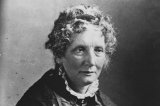Analysis of Think Not All Is Over
Harriet Beecher Stowe 1811 – 1896
Think not, when the wailing winds of autumn
Drive the shivering leaflets from the tree,—
Think not all is over: spring returneth,
Buds and leaves and blossoms thou shalt see.
Think not, when the earth lies cold and sealed,
And the weary birds above her mourn,—
Think not all is over: God still liveth,
Songs and sunshine shall again return.
Think not, when thy heart is waste and dreary,
When thy cherished hopes lie chill and sere,—
Think not all is over: God still loveth,
He will wipe away thy every tear.
Weeping for a night alone endureth,
God at last shall bring a morning hour;
In the frozen buds of every winter
Sleep the blossoms of a future flower.
| Scheme | XABA XXBX AXBX BCCC |
|---|---|
| Poetic Form | Quatrain (25%) |
| Metre | 1110101110 1010010101 11111011 101010111 111011101 001010101 111110111 10110101 1111111010 111011101 111110111 1110111001 10101011 1111101010 00101110010 1010101010 |
| Closest metre | Iambic pentameter |
| Characters | 667 |
| Words | 136 |
| Sentences | 4 |
| Stanzas | 4 |
| Stanza Lengths | 4, 4, 4, 4 |
| Lines Amount | 16 |
| Letters per line (avg) | 32 |
| Words per line (avg) | 8 |
| Letters per stanza (avg) | 129 |
| Words per stanza (avg) | 30 |
About this poem
"Think Not, All Is Over" is a poem by Harriet Beecher Stowe, an American abolitionist and author best known for her novel "Uncle Tom's Cabin." The poem reflects themes of hope, resilience, and the enduring spirit of humanity. Stowe encourages readers to find strength in times of difficulty and not to lose hope, even when facing challenges. The verses convey a message of perseverance and the belief that, despite hardships, there is a capacity for renewal and the possibility of a brighter future. Overall, "Think Not, All Is Over" serves as a source of inspiration and encouragement. more »
Written on 1867
Submitted by Drone232 on July 01, 2022
Modified by acronimous on January 07, 2024
- 40 sec read
- 1,858 Views
Citation
Use the citation below to add this poem analysis to your bibliography:
Style:MLAChicagoAPA
"Think Not All Is Over" Poetry.com. STANDS4 LLC, 2024. Web. 30 Apr. 2024. <https://www.poetry.com/poem-analysis/130946/think-not-all-is-over>.


Discuss this Harriet Beecher Stowe poem analysis with the community:
Report Comment
We're doing our best to make sure our content is useful, accurate and safe.
If by any chance you spot an inappropriate comment while navigating through our website please use this form to let us know, and we'll take care of it shortly.
Attachment
You need to be logged in to favorite.
Log In